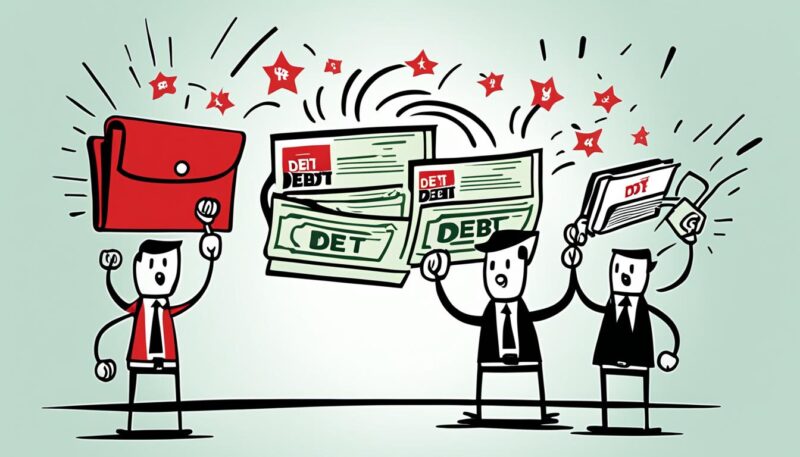Did you know that in the United States, over $130 billion in debt goes unpaid each year? When someone owes you money, it can be frustrating and challenging to get them to pay up. But fear not, there are effective strategies you can use to shame debtors into repaying what they owe. In this article, we will explore 11 tips on how to shame someone who owes you money, helping you navigate the world of debt collection and financial disputes.
Key Takeaways:
- Consider the intentions of the person who owes you money before resorting to shaming tactics.
- Be direct and have an open conversation, asking for repayment.
- Use humor to subtly remind the debtor of their debt.
- Involve mutual acquaintances or extroverted individuals to create social pressure.
- Mention your own financial constraints as a gentle reminder.
Consider Their Intentions

Before resorting to shaming tactics, it’s essential to consider the intentions of the person who owes you money. Understanding their reasons for not paying back can provide valuable insights into their circumstances and help you choose the most effective strategy to resolve the situation.
Debtors may have various reasons for not paying back, and it’s important to approach the situation with empathy and open-mindedness. Financial difficulties can often be a major factor that prevents them from fulfilling their obligations. They might be experiencing job loss, unexpected expenses, or other financial hardships that make it challenging for them to repay their debts.
In some cases, debtors may simply forget to pay. Life can be hectic, and financial obligations can slip their mind. It’s crucial to remember that forgetting to pay back doesn’t necessarily indicate deliberate avoidance. A gentle reminder might be enough to prompt them into action.
On the other hand, deliberate avoidance is also a possibility. Some individuals may intentionally avoid paying back their debts due to personal reasons or disputes. In such cases, understanding their motivations and thoughtfully addressing the underlying issues can help initiate a resolution.
By considering the intentions behind a debtor’s actions, you can approach the situation with a clearer perspective. This will allow you to tailor your approach and choose the most appropriate strategy to encourage repayment while maintaining a fair and respectful relationship.
Examples of Intentions of Debtors
| Reasons | Description |
|---|---|
| Financial Difficulties | Debtor is facing financial hardships, such as job loss or unexpected expenses. |
| Forgetting to Pay | Debtor unintentionally forgets about their obligation and needs a gentle reminder. |
| Deliberate Avoidance | Debtor intentionally avoids paying back due to personal reasons or disputes. |
Be Direct
One effective strategy for dealing with someone who owes you money is to have a direct approach. Open communication and asking for repayment through a frank conversation can often yield positive results.
“Hey [Debtor’s Name], I hope you’re doing well. I wanted to talk to you about the money you owe me. I know it may be an uncomfortable topic, but I believe in open and honest communication. Can we have a conversation about when you plan to repay me? I’m sure we can work something out.”
By addressing the issue head-on, you create an opportunity for the debtor to face the reality of their obligations. Open dialogue allows for a clear understanding of expectations and can prompt them to take action.

Implementing a direct approach demonstrates your determination to resolve the situation and reinforces the seriousness of the matter. It also sets the tone for a productive discussion, where both parties have the opportunity to express their concerns and find a mutually beneficial solution.
In the next section, we’ll explore how humor can be used as a shaming tactic to motivate debtors to repay their debts.
Use Humor
If a direct approach doesn’t suit your style, why not try adding a touch of humor to shame someone into paying you back? Using a light-hearted approach can be a gentle reminder of their debt while also diffusing any tension or awkwardness. Humor has a way of opening up conversations and making people more receptive to your message.
Social situations provide the perfect opportunity to casually drop a humorous comment about being owed money. For example, you could say something like, “Hey, remember that time you borrowed money from me? I should start charging interest!” This playful remark not only reminds the person of their debt but also offers a humorous twist that might lighten the mood.
Remember, the goal is not to embarrass or shame the person excessively, but rather to nudge them into action with a humorous comment that subtly reinforces their obligation. This light-hearted approach can work wonders, especially if the person has simply forgotten about the money owed.
Involve Others
Another effective strategy for shaming someone who owes you money is to involve mutual acquaintances. By seeking help from others, especially extroverted individuals who can’t resist sharing the situation, you can put social pressure on the debtor and increase the likelihood of repayment.
When you involve others, it creates a sense of accountability for the debtor. Knowing that their failure to repay the debt could become public knowledge makes it harder for them to ignore their financial obligation.
When seeking help from mutual acquaintances, it’s important to approach the situation tactfully. Express your concerns and explain the impact the debt has on your financial well-being. By sharing your side of the story, you can garner support and create a network of individuals who understand the gravity of the situation.
Reaching out to mutual acquaintances can also open up opportunities for mediation or negotiation. Sometimes, having a third party involved can help facilitate a conversation and encourage the debtor to take responsibility for their actions.
Remember, involving others should be done carefully and with respect for everyone involved. It’s important to maintain a balanced approach and avoid making the situation more stressful or confrontational. The goal is to foster a sense of collective responsibility and encourage the debtor to fulfill their financial obligation.
Possible Outcomes of Involving Others
| Possible Outcome | Description |
|---|---|
| Increased Social Pressure | When others are aware of the debt, it creates social pressure on the debtor to repay what they owe. |
| Mediation and Negotiation | Involving mutual acquaintances can open up opportunities for mediation or negotiation to find a mutually acceptable solution. |
| Accountability and Responsibility | Having others aware of the debt can help hold the debtor accountable and responsible for their actions. |
| Support and Understanding | By involving others, you can create a support network that understands the impact of the debt on your financial well-being. |
Mention Financial Constraints

Indirectly shame someone into paying you back by mentioning your own financial difficulties in conversation. This approach relies on empathy and the unspoken understanding that their debt is contributing to your financial constraints.
- Discuss the impact their unpaid debt has on your ability to make ends meet.
- Express the challenges you face in managing your expenses due to their outstanding payment.
- Emphasize the emotional and financial stress their debt puts on you.
Empathy Through Shared Financial Struggles
By openly sharing your own financial difficulties, you create a connection based on empathy. This approach allows the debtor to see the consequences of their actions and may motivate them to prioritize repayment.
Indirectly shaming someone through empathy can be a powerful tool for resolving outstanding debts while maintaining a civil relationship. It is important to approach these conversations with a calm and sincere tone, highlighting the impact their debt has on your life.
You can also read: Is Rent A Friend Legit?
Consider Legal Options
If all else fails, it may be necessary to explore legal routes for debt collection. Depending on the amount owed and the jurisdiction you are in, there are several options available to help you recover the funds owed to you.
One common legal avenue is filing a claim in small claims court. Small claims court is designed to handle disputes involving relatively small amounts of money, typically under a certain threshold set by each jurisdiction. It offers a simplified process that allows individuals to have their case heard before a judge without the need for expensive legal representation.
If the amount owed exceeds the small claims court threshold, you may need to file a lawsuit in civil court. This involves initiating legal proceedings against the debtor, presenting your case before a judge or jury, and seeking a judgment in your favor. Keep in mind that pursuing a lawsuit can be a more complex and costly process, often requiring legal representation.
Pros and Cons of Legal Options for Debt Collection
| Option | Pros | Cons |
|---|---|---|
| Small Claims Court |
|
|
| Civil Lawsuit |
|
|
It’s important to weigh the advantages and disadvantages of each legal option before proceeding. Consider the amount owed, the likelihood of successful recovery, and the costs involved. Consulting with an attorney specializing in debt collection can provide valuable guidance throughout the legal process.
Remember that pursuing legal action should be a last resort, as it can be time-consuming, emotionally draining, and costly. It’s always recommended to explore other avenues for resolving the debt before taking legal measures.
The Path to Financial Freedom

Overcoming debt shaming can be a challenging and stressful process, but it’s important to remember that being in debt does not define your character. There are steps you can take to regain control of your financial situation and work towards financial freedom.
First and foremost, investing in financial literacy is crucial. Educating yourself about personal finance can help you make informed decisions, create a budget, and develop strategies to manage your debt effectively. By understanding how money works and learning about different financial tools and resources, you can empower yourself to make better financial choices.
Improving your money mindset is another key component. It’s important to shift your perspective from feeling shame or guilt about your debts to a mindset of growth and opportunity. Recognize that facing financial challenges is a part of life, and focus on learning from your mistakes and taking positive steps forward.
Taking control of your finances is essential in overcoming debt shaming. Create a comprehensive plan to pay off your debts, including setting achievable goals and prioritizing your payments. Consider seeking help from financial professionals who can provide guidance tailored to your specific situation.
Remember, you are not alone in this journey. There are numerous resources available, from support groups to financial counseling services, that can provide you with the guidance and encouragement you need to overcome debt shame and achieve financial freedom. By taking proactive steps, you can regain control of your financial well-being and build a brighter future.
FAQ
What should I consider before shaming someone who owes me money?
It’s important to consider the intentions of the person who owes you money. They may have valid reasons for not paying back, such as financial difficulties or simply forgetting. Assess their motivations before deciding on the best strategy.
How can I be direct with someone who owes me money?
Have an open and honest conversation with them, asking when they plan to repay you. This straightforward approach can often lead to a resolution and prompt them to take action.
Can using humor be an effective tactic to shame someone into paying me back?
Yes, making lighthearted jokes about being owed money in social situations can subtly remind them of their debt. This approach can be effective, especially if the person has simply forgotten about the money owed.
How can involving others help shame a debtor into paying me back?
By letting mutual acquaintances know about the debt, you create social pressure on the debtor, increasing the likelihood of repayment.
Can indirectly mentioning my own financial constraints help shame someone into paying me back?
Yes, discussing your own financial difficulties in conversation can serve as a gentle reminder and nudge the debtor towards repayment, relying on empathy and the unspoken understanding that their debt is contributing to your hardships.
What legal options can I consider for debt collection?
Depending on the amount owed, you can file a claim in small claims court or pursue a lawsuit in civil court. These processes can help secure the repayment of the money owed to you, but it’s important to be aware of the associated costs and complexities.
How can I overcome the shame associated with being owed money?
By educating yourself, improving your money mindset, and taking control of your finances, you can overcome the shame and work towards financial freedom. Remember, you are not alone, and there are resources and strategies available to help you.




